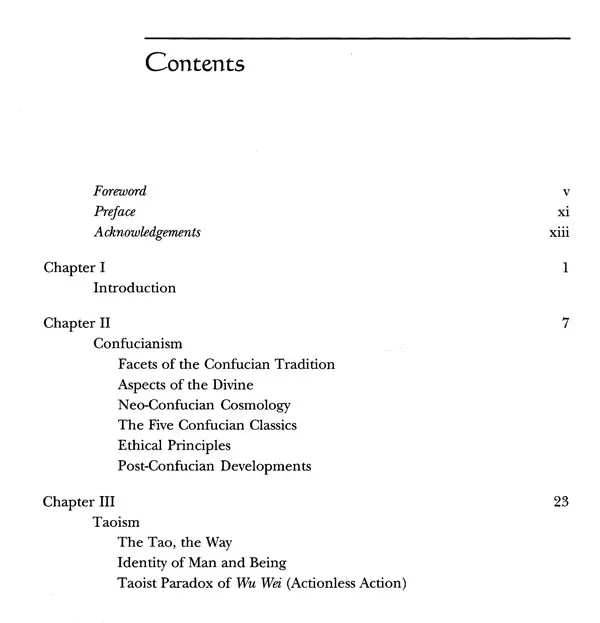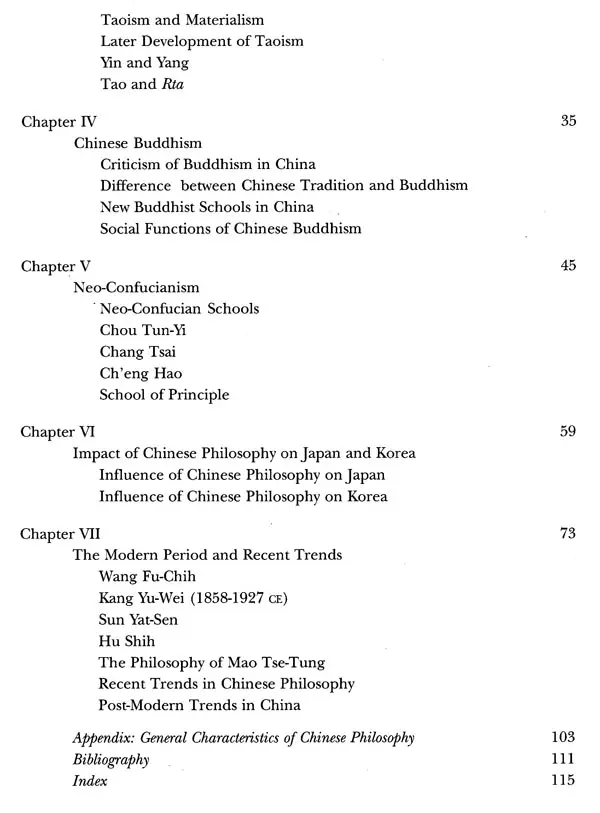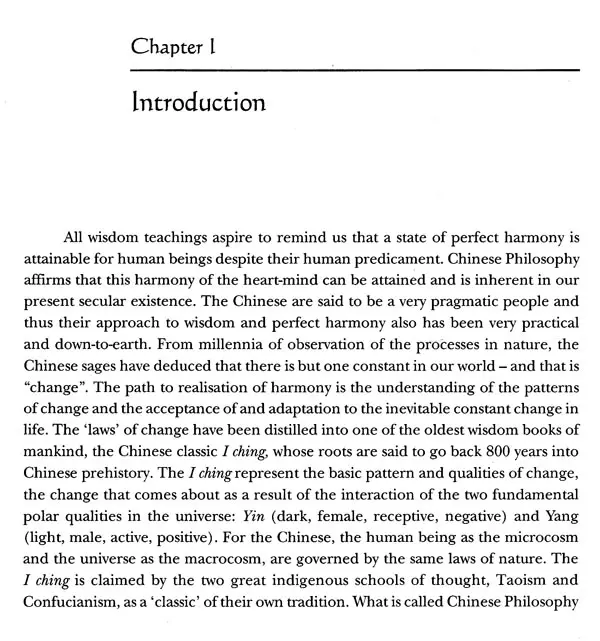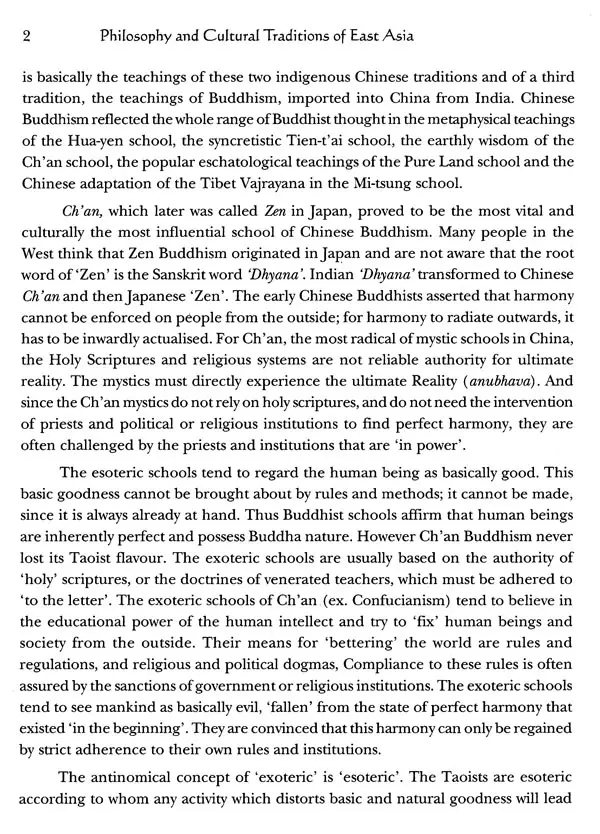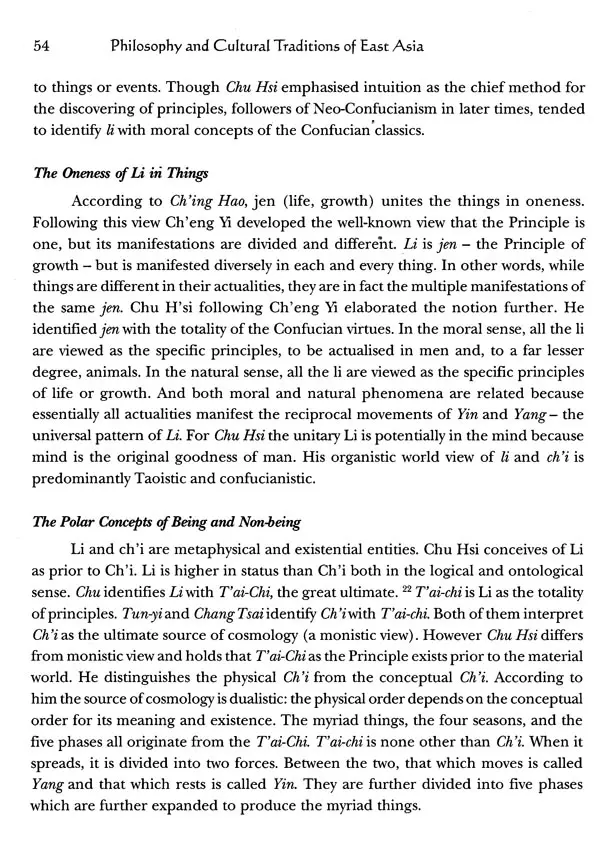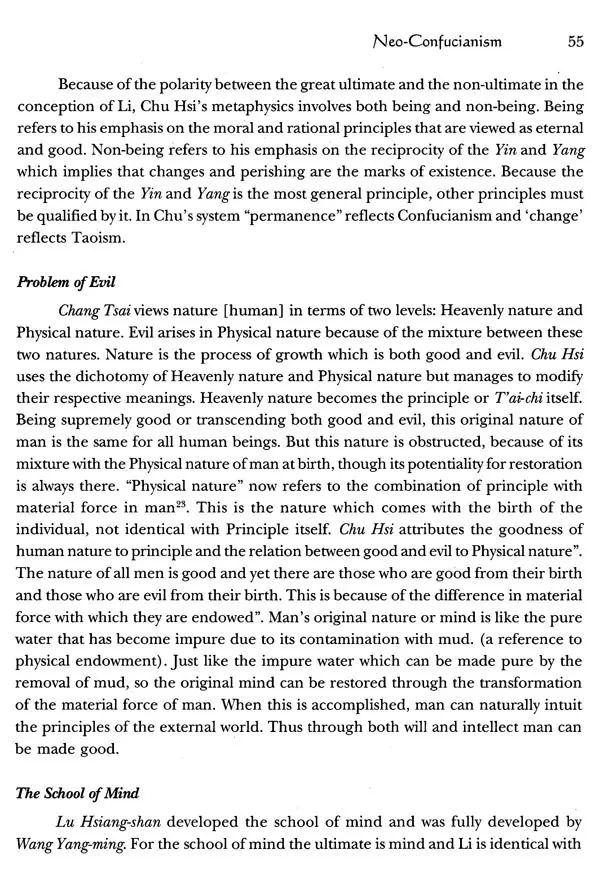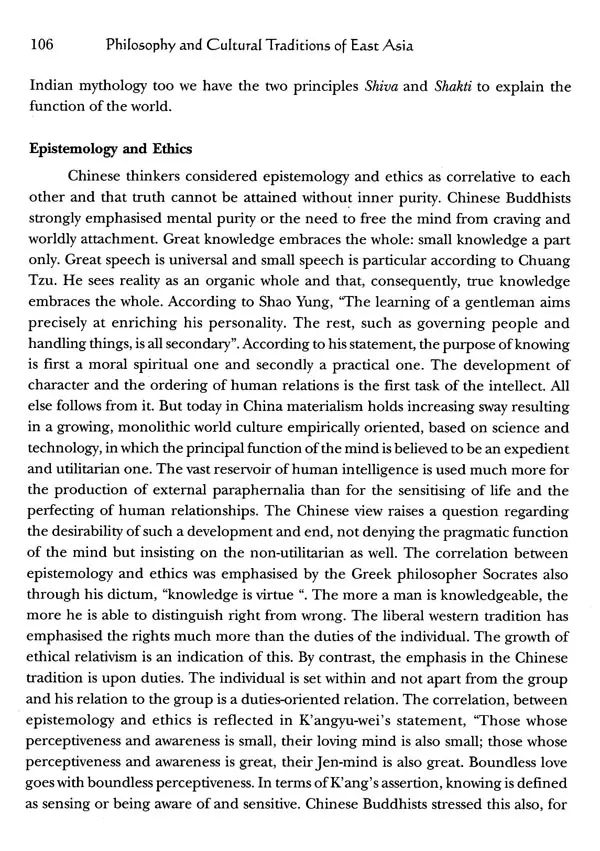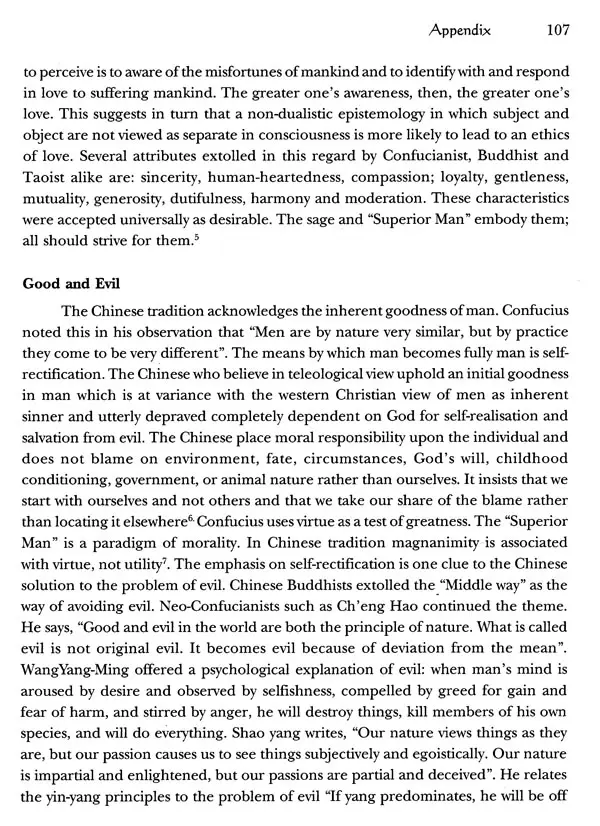
Philosophy and Cultural Traditions of East Asia
Book Specification
| Item Code: | UAE318 |
| Author: | A. Appan Ramanujam |
| Publisher: | Sharada Publishing House, Delhi |
| Language: | English |
| Edition: | 2021 |
| ISBN: | 9789383221325 |
| Pages: | 132 |
| Cover: | HARDCOVER |
| Other Details | 10.00 X 8.00 inch |
| Weight | 520 gm |
Book Description
The present book rests on three observations, i.e. Confucianism, which is moralistic; Taoism, which is naturalistic/materialistic; and the Buddhism which is metaphysical in nature.
The esoteric School in Philosophy tends to regard the human being as basically good. This basic goodness cannot be brought by rules and methods. The Taoists are esoteric according to whom any activity which distorts basic and natural goodness will lead to imperfection. The exoteric schools tend to see mankind as basically evil, 'fallen' from the state of perfect harmony. These schools believe in scriptures or the doctrines of venerated teachers to restore harmony in the society. Confucius preached humanism, family value and love which will lead to social stability. Social stability is vital for political stability. Confucius teachings are relevant even today for social and political stability. Dr Ramanujam has given equal weightage to Neo-Confucianism, impact of Chinese philosophy on Japan, Korea and the modern period and recent trends in Chinese philosophy too.
Sun-Yat-Sen, who is called the father of China, attempted a synthesis of Western Philosophical concepts with Chinese tradition and laid the foundation for modern China. Mao-Tse-Tung's communist revolution brought about social and political changes in China. In a nutshell, the book is exhaustive and will find it worth-reading, worth-remembering and worth-reciting and quoting.
Dr A. Appan Ramanujarn (b. 1947) did his B.Sc. (Physics) from Madurai University and M.A. (Philosophy) and Ph.D. from Annamalai University. He was awarded the Junior Research Fellowship by the U.G.0 in 1976. Apart from research papers, articles and scripts on philosophical topics, he delivered lectures on Philosophy of Science. Starting his career as a Demonstrator in Physics (1969-1971) at AJ. College, Sivakasi, he retired as a Head of the Department of Philosophy, Ramakrishna Mission Vivekananda College, Chennai in 2006. His main interests are Ethics, Psychology, Western Philosophy, Philosophy of Science and Vaisnavism. He participated as a symposia’s at the 79th session of the Indian Philosophical Congress held at Madurai College, Madurai on Values in Education in 2004 and at the World Philosophy Congress held at Delhi University, New Delhi on Justice in 2006. The All India Sattada Srivaisnava Association has conferred on him the title "Vaisnava Kula Bhushana" for his original contribution to Vaisnavism. He was the Director of the National Seminar, "Indian Philosophical Heritage: A Re-understanding", March 2006, sponsored by Indian Council of Philosophical Research (I.C.P.R), New Delhi, held at R.K.M. Vivekananda College, Chennai. He was invited to deliver the Acharya Tulsi Endowment Lectures in January 2007 by the Department of Jainology, University of Madras.
In most of the academic forums, panel discussions, training sessions and day-to-day conversations among the elite audience, reference to Chinese Philosophy or Confucius statements finds a place because the utterances inspire and influence our thinking and in our interest, if we start collecting the words of wisdom among the Chinese philosophers, we are not at ease with our online sources; because most of them are not validated. At that point of desperation we keep yearning for a book written by worthy men of noble instinct, knowledge and culture. Having realized the learning pulse of an individual Dr A. Appan Ramanujam, philosopher, scholar, professor and educator has written a book "Philosophy and Cultural Traditions of East Asia" which quenches our thirst for cultural diversity. The distinct quality of his book at the outset is the reliability that he has created among the readers. The number of source books that he has referred, suffices the fact that the writer has taken all initiatives to be thorough and well-versed in the area that he has intended to publish. This subject involvement, carefulness, mastery and in-depth analysis as a writer are lessons to be learnt by all those who desire to publish books on philosophy.
The focal point of the book rests on three observations. One is Confucianism, which is moralistic, the second is Taoism, which is naturalistic/ materialistic and the third one is Buddhism which is metaphysical in nature. Dr Ramanujam has given equal weightage to Neo-Confucianism, impact of Chinese philosophy on Japan, Korea and the modern period and recent trends in Chinese philosophy too. In a nutshell, the book is exhaustive and will find it worth-reading, worth-remembering and worth-reciting and quoting.
As stated in the words of Mencius, "Man's nature is naturally good just as water naturally flows downward", similarly the style and the tone of the book flows so frankly, effortlessly and spontaneously that the readers will definitely feel comfortable to go through the book.
It is due to his inherent role as a teacher; Dr Ramanujam differentiates but finally integrates all schools of thought so comprehensively that the readers will surely thank him for throwing light on hitherto unread areas of Chinese philosophy. Dr Ramanujam is the creative transmitter of the wisdom of the past. The organization of the book, the due acknowledgement to the existing sources that he has made use of and the neat wrap up in the form of "Appendix" which lists down the general characteristics of Chinese philosophy ascertain his proven skill as a writer with necessary expertise to cater to the needs of the reading public.
The book hardly poses language difficulty. It is quite flawless and flow of thought is quite admirable. The writer does not argue or take sides but remains neutral in foregrounding the crux of each philosophy. For instance, he quotes "The Darwinian Theory of the survival of the fittest is against the Chinese tradition of harmonious existence of all living species". "Co-operation" rather than "Competition" should be the means of social harmony according to the Chinese tradition.
Equally, Dr Ramanujam has neatly summarized, rather concluded that, the American individualism has its own drawbacks but they can be overcome by the universalism of the Chinese tradition. Thus the book presents a holistic perception. The writer, in addition to the factual knowledge that he has given, has also implicitly stated that there is a basic unity among men which should transcend all barriers of race creed and nation.
The book in short is a value addition. It has a sense of completion. It is highly original, reader friendly, reliable and worth owning. The book is an evidence for the writer's determination, devotion and dedication to his professional school of philosophy at every inch.
A teacher, retired or in service is always desirous of contributing to the learning community in every way. All teach, but a few take extra miles in leaving a legacy by way of undertaking writing books for the benefit of the learners. Book writing perpetuates the image of the teacher. In that way, Dr Appan Ramanujam has made him to go into minds and memories by his book. His book, I am sure is a value addition to the School of Philosophy.
I am honored to give my foreword in the real sense of the word. That the writer has taken so much pain to write a book after retirement is an indication that there is no end or age limit for one's thirst for knowledge and also for the willingness to share what one knows with others because "Sharing knowledge is Dharma". And I am privileged to be a part of this knowledge sharing event, through my foreword.
Thank you readers, Have a good read.
This book, Philosophy and Cultural Traditions of East Asia, is the result of my interest to introduce Chinese Philosophy to the Indian students and the beginners. Chinese culture and philosophy are as ancient as Indian culture and philosophy. Though many schools of thought and "ISMS" of the western tradition are taught in our colleges and universities, but only a few institutions in India offer courses on Chinese studies. Unlike Indian philosophy which has strong metaphysical foundations, Confucianism, the main school of Chinese Philosophy is concerned only with ethical questions. However, Chinese Buddhism and Taoism provided meta-physical basis for Confucianism at the later period (Neo-Confucianism). In the modern period, the impact of western thought and Christianity can be witnessed in the writings of Chinese thinkers; Berkeley's `idealism' and John Dewey's 'pragmatism' were transformed to Chinese versions of idealism and pragmatism. Sun Yat-Sen tried to synthesise western thought with Chinese tradition. However, it was Mao Tse-Tung's Communist revolution which tried to establish classless society in China. Sun Yat-Sen is called the father of China (as Mahatma Gandhi is the father of our nation). The Chinese thinkers remind us that harmonious existence of human beings is possible only through co-operation and not through competition. Their approach to wisdom is pragmatic and down to earth. Their value system has survived several millennia.
